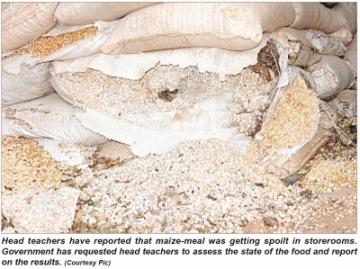FOOD ROTTING IN SCHOOLS

MBABANE – Head teachers have come out to claim that food in schools is rotting while over 300 000 emaSwati are in urgent need of food aid.
According to the 2019 Eswatini Vulnerability Assessment findings, about 230 000 emaSwati face acute food insecurity. However, with the advent of COVID-19, slightly over 300 000 people have been identified as beneficiaries of the food aid programme pioneered by government.
The National Disaster Management Agency (NDMA) noted that the figures of food insecure emaSwati could escalate due to the outbreak of the coronavirus pandemic.
The issue of rotting food in schools has raised concerns among head teachers after government had intended to donate the food to the needy following that schools were closed due to the partial lockdown which was implemented about two months ago.
Memorandum
The Ministry of Education and Training, through a memorandum sent through regional education officers (REOs), had requested head teachers to provide information of current quantities of food supplies in their respective schools.
The form they had to fill required the head teachers to identify the school, the school code and amount of: beans, maize, rice, cooking oil and peanut butter among others. Information gathered was that the ministry intended to distribute the food to the needy following the indefinite closure of schools.
In an interview with some of the head teachers, they said they welcomed government’s decision to donate the food to the needy, but to date it had not been collected and was wasting away in the storerooms. They said most of the storerooms were not well built, resulting in the food rotting.
They claim that rain water sipped into the storerooms where the food was kept, resulting in the food items being soaked and ultimately rotting.
Victimisation
A head teacher in one of the schools in the Manzini Region, who preferred anonymity in fear of victimisation, said they were told to avail records of the food which had to be submitted to their executive and they did just that.
“We are shocked that to date the food which is now rotting has not been collected by government yet there are thousands of people starving,” the head teacher said.
She said when government issued the instruction in April that they should supply information on the quantities of food in the various schools, it was already starting to get spoilt as some of it had been distributed to the schools in February yet the storerooms were not conducive for keeping food.
“When I last checked the food about a week ago, it was in a very bad state,” the head teacher said.
She said there were about seven 50kg beans and rice, three bags of 50 kg maize- meal and samp at her school. “Both the maize-meal and samp are spoilt, save for the beans.”
The head teacher said they had tried to contact the inspector of schools to find out what was happening and they were allegedly told that they had no clue, since the ministry had been mum on the issue.
Another head teacher in the Lubombo Region also said when he last checked the food, it was not in a very good state. He said even if schools could reopen, the food would not be fit for consumption by the pupils due to its current state.
Meanwhile, another head teacher from the same region echoed his colleagues’ sentiments, adding that the food was attracting weevil. “I have at least four bags of beans and when I recently checked, I found out that it had weevils,” he said.
The head teacher said it was the same issue with the five bags of maize which also had weevils.
He added that he had fears that the food was no longer in a consumable state.
Swaziland Association of Schools’ Administrators (SASA) Secretary Siphasha Dlamini said they had received several reports from head teachers that the food was spoilt. Dlamini said, in particular, the maize-meal got spoilt quickly.
The secretary said they had no idea why government decided not to collect the food following its announcement but they suspected that there was influence from some sectors or concerns if schools would reopen.
Meanwhile, she said government had sent them a message to go to schools to assess the state of the food and report on their assessment.
President of the Eswatini Principals Association, Welcome Mhlanga, said there were no reports received by the organisation on food that was rotting in schools. Mhlanga said they had only received an instruction through UNICEF to forward information to the ministry on the state of the food in their various schools.




 del.icio.us
del.icio.us Digg
Digg
Comments (0 posted):